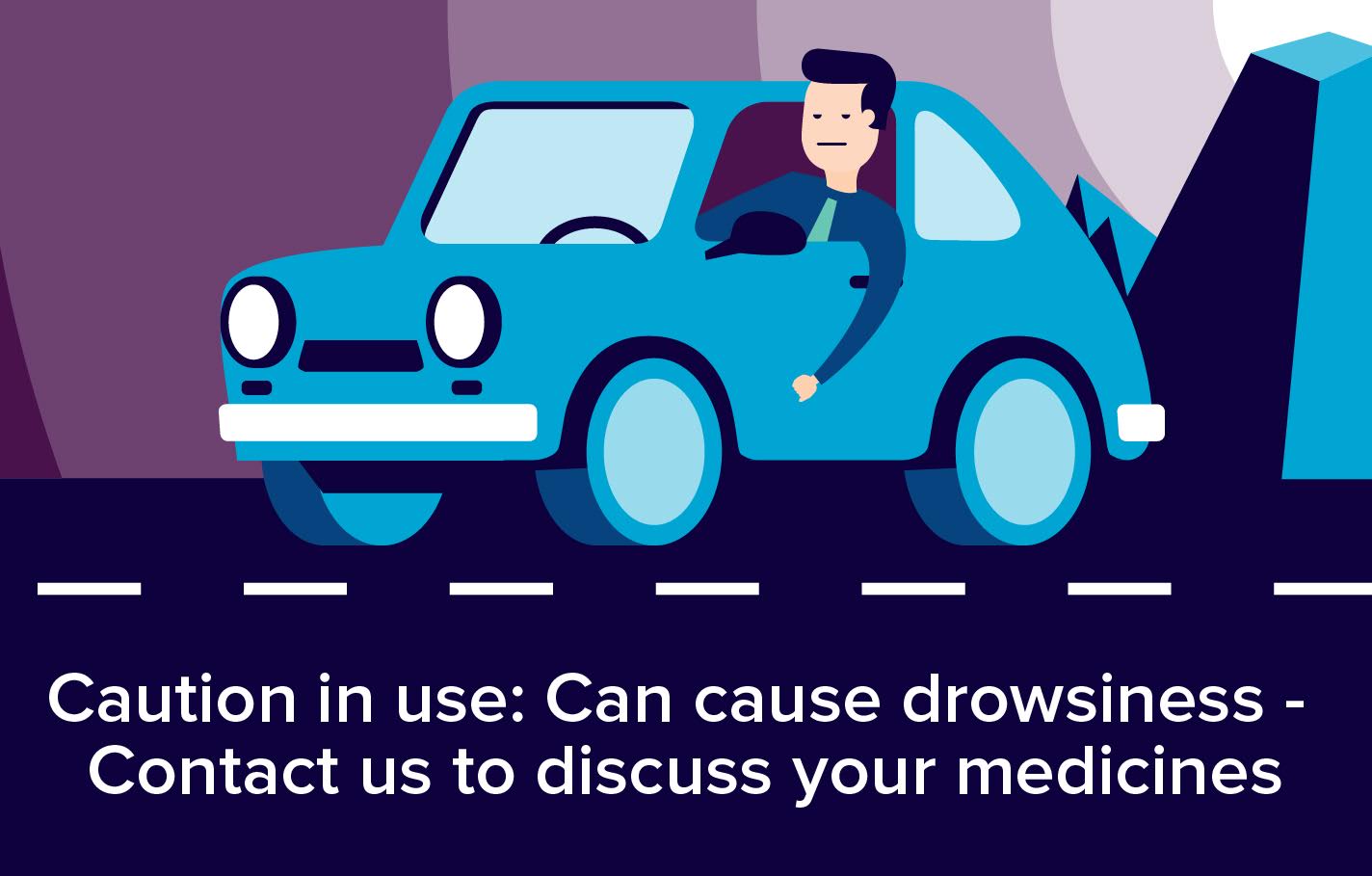Cyclizine is a type of medicine called an antihistamine. It is used to prevent and treat nausea and vomiting associated with middle ear disorders, motion (travel sickness) and following surgery or radiotherapy.

What is it used for?
- Preventing and treating motion sickness (travel sickness).
- Preventing and treating nausea and vomiting following surgery or radiotherapy.
- Relieving nausea, vomiting and spinning sensations associated with Meniere's disease and other middle ear disorders.
How does it work?
- Cyclizine is a type of medicine called an antihistamine. It is used to prevent and treat nausea and vomiting associated with middle ear disorders, motion (travel sickness) and following surgery or radiotherapy.
- Vomiting is controlled by an area of the brain called the vomiting centre. The vomiting centre is responsible for causing feelings of sickness (nausea) and for the vomiting reflex. It is activated when it receives nerve messages from the vestibular apparatus in the middle ear.
- The vestibular apparatus provides continual feedback to the brain about our body position.
How do I take it?
- Cyclizine tablets should be taken with a drink of water. They can be taken either with or without food.
- Adults and children over 12 years of age can take one 50mg tablet up to three times a day.
- Children aged 6 to 12 years can be given half a tablet (25mg) up to three times a day.
- To prevent motion sickness a dose should be taken about one to two hours before travelling.
Not to be used in
- Children under six years of age.
- This medicine should not be used if you are allergic to one or any of its ingredients. Please inform your doctor or pharmacist if you have previously experienced such an allergy.
If you feel you have experienced an allergic reaction, stop using this medicine and inform your doctor or pharmacist immediately.
Use with caution in
- Liver disease.
- Severe heart failure.
- People with any obstruction or blockage in the stomach or intestines.
- Men with an enlarged prostate gland (prostatic hypertrophy).
- Glaucoma.
- Epilepsy.
Pregnancy and breastfeeding
Certain medicines should not be used during pregnancy or breastfeeding. However, other medicines may be safely used in pregnancy or breastfeeding providing the benefits to the mother outweigh the risks to the unborn baby. Always inform your doctor if you are pregnant or planning a pregnancy, before using any medicine.
- The safety of this medicine during pregnancy has not been fully established. As with all medicines, it should only be used during pregnancy if the potential benefits outweigh any potential risks to the developing baby. Get medical advice from your doctor before taking this medicine if you are pregnant.
- It is not known if this medicine passes into breast milk. Seek medical advice from your doctor before taking this medicine if you are breastfeeding.
Side effects
Medicines and their possible side effects can affect individual people in different ways. The following are some of the side effects that are known to be associated with this medicine. Just because a side effect is stated here, it does not mean that all people using this medicine will experience that or any side effect.
- Drowsiness.
- Headache.
- Dry mouth, nose or throat.
- Blurred vision.
- Rash.
- Faster than normal heart beat (tachycardia).
- Difficulty passing urine (urinary retention).
- Constipation.
- Restlessness.
- Nervousness.
- Difficulty sleeping (insomnia).
- False perceptions of things that are not really there (hallucinations).
- Abnormal movements of the hands, legs, face, neck and tongue, eg tremor, twitching, rigidity.
- Dizziness.
- Convulsions.
- Pins and needles sensations.
- Increased blood pressure.
- Jaundice.
The side effects listed above may not include all of the side effects reported by the medicine's manufacturer.
For more information about any other possible risks associated with this medicine, please read the information provided with the medicine or consult your doctor or pharmacist.
How can this medicine affect other medicines?
It is important to tell your doctor or pharmacist what medicines you are already taking, including those bought without a prescription and herbal medicines, before you start taking this medicine. Similarly, check with your doctor or pharmacist before taking any new medicines while taking this one, to make sure that the combination is safe.
There may be an increased risk of drowsiness if this medicine is taken with any of the following (which can also cause drowsiness):
- alcohol
- antipsychotics, eg haloperidol, chlorpromazine
- benzodiazepines, eg diazepam, temazepam
- sedating antihistamines, eg chlorphenamine, promethazine
- sleeping tablets, eg zopiclone
- strong opioid painkillers, eg morphine, codeine, tramadol
- tricyclic antidepressants, eg amitriptyline.
If this medicine is taken with other medicines that have antimuscarinic effects there may be an increased risk of side effects such as blurred vision, dry mouth and constipation. Other medicines with antimuscarinic effects include the following:
- amantadine
- antimuscarinic medicines for Parkinson's symptoms, eg procyclidine, orphenadrine
- antimuscarinic medicines for urinary incontinence, eg oxybutynin, tolterodine, solifenacin, propiverine
- antihistamines, eg brompheniramine, chlorphenamine
- antipsychotic medicines, eg haloperidol, chlorpromazine, clozapine
- antispasmodic medicines, eg hyoscine, atropine
- disopyramide
- MAOI antidepressants, eg phenelzine, tranylcypromine
- tricyclic antidepressants, eg amitriptyline, clomipramine.
References:
http://www.netdoctor.co.uk/medicines/cancer/a7928/cyclizine-tablets/
http://www.news-medical.net/drugs/Valoid.aspx
https://www.drugs.com/uk/valoid-50mg-tablets-leaflet.html
http://www.medsafe.govt.nz/Consumers/CMI/v/valoid.pdf
https://en.wikipedia.org/wiki/Cyclizine

